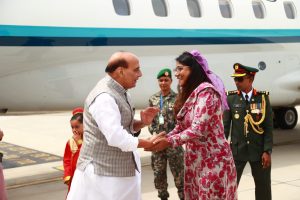Indian Defense Minister Rajnath Singh is in Maldives this week. Maldives has remained one of India’s key maritime partners in the Indian Ocean neighborhood. The visit assumes strategic importance in the context of China’s greater military influence and assertiveness in the Indian Ocean region.
During the visit, Singh and Maldivian Defense Minister Mariya Didi agreed to strengthen their bilateral defense and security cooperation while “upholding a rules-based order.” Singh also met with the Maldivian foreign minister, Abdulla Shahid, and the two discussed issues around bilateral defense cooperation and infrastructure development partnership.
In a press release prior to the visit, the Indian Ministry of Defense said the visit is aimed to bring closer cooperation between India and Maldives “to effectively address shared challenges, including maritime security, terrorism, radicalization, piracy, trafficking, organized crime and natural disasters.” Both countries also bring to bear the Indian policy vision of SAGAR (Security and Growth for All in the Region), its “Neighborhood First” policy, and Maldives’ “India First” policy to understand and respond to the requirements of each other in terms of policy and capabilities. According to another press release issued by the ministry, the two defense ministers discussed “issues of mutual defense cooperation and new initiatives to strengthen defense and security partnership.”
In line with India’s efforts at stepping up the capability and capacity building of partner countries in the Indian Ocean region, India also handed over a fast patrol vessel along with a landing craft assault ship to the Maldivian National Defense Forces (MNDF). The patrol vessel, capable of coastal and offshore surveillance at high speeds, was commissioned as MNDF Coast Guard Ship Huravee.
At the handover ceremony, Singh stated that these platforms were given to Maldives as “a symbol of the shared commitment of India and the Maldives towards peace and security in the Indian Ocean Region.” He went onto say that “India has emerged as a leading defense exporter in recent years. A defense manufacturing ecosystem has been created which has the advantage of abundant technical manpower. We produce world-class equipment to meet not only our own needs, but also for exports.” The minister added that India will continue to offer an “enhanced defense partnership to friendly foreign countries, that is accommodative of their national priorities and capacities.”
Singh also made a strong case for strengthened regional cooperation in the Indian Ocean by saying that the “Indian Ocean is our shared space. The primary responsibility for peace, stability and prosperity in the region rests with those who live in the region.”
Given the maritime dominance in the India-Maldives relationship, the two countries had earlier signed an agreement to “develop, support and maintain a Maldives National Defense Force Coast Guard Harbor” for enhanced maritime security cooperation in the region. The harbor will be developed at the Uthuru Thila Falhu naval base, and the Indian side has already submitted a Detailed Project Report (DPR) on its development.
India has also been providing support in the maintenance and repair of the MNDF Coast Guard Fleet. India’s External Affairs Minister Dr. S Jaishankar, who was on a visit to the island nation in February, tweeted following the signing of the agreement that it “will strengthen Maldivian Coast Guard capability and facilitate regional HADR [humanitarian assistance and disaster relief] efforts. Partners in development, partners in security.” The Maldivian defense minister reciprocated the sentiments by tweeting, “The Coast Guard Harbor & Dockyard at SIFAVARU will mark another significant milestone.” The harbor development forms part of a defense action plan signed by then-Maldivian President Abdulla Yameen Abdul Gayoom during a visit to India in 2016.
High-level engagements with Maldives have seen an uptick in recent years. In 2022, Indian Prime Minister Narendra Modi was in Maldives to launch the Greater Malé Connectivity Project (GMCP) with Maldivian President Ibrahim Mohamed Solih. The GMCP includes a 6.74-km-long bridge and causeway link connecting the capital city, Malé, with adjoining islands of Villingli, Gulhifalhu, and Thilafushi. The GMCP has been undertaken with Indian grant of $100 million and a $400 million line of credit. During a joint press briefing, Modi said that India has committed a $100 million line of credit for other development projects in the Maldives.
In addition to connectivity and development projects, the two sides also exchanged six documents pertaining to: “collaboration on potential fishing zone forecast capacity building; cooperation in the area of cyber security; capacity building of women development committees and local government authorities of Maldives; cooperation in disaster management; USD 41 [million] Buyer’s Credit Agreement to construct police infrastructure; and Letter of Intent for Buyer’s Credit financing of 2,000 social housing units.”
Defense and security ties also found worthy attention between the two leaders in their discussions last August. The 33-point joint statement went into details on the capacity building that India is engaged in beefing up the capability of the Maldives’ National Defense Forces.
In addition to Modi’s visit last year, Indian Defense Secretary Giridhar Aramane visited Maldives in April this year, during which he had talks with his Maldivian counterpart, Major General Abdulla Shamaal.
Given Chinese efforts at closer relations in Maldives, a key Indian Ocean nation, India’s antennas are up, and New Delhi will continue to remain vigilant as to its presence in Maldives and in the broader Indian Ocean region. This strategic imperative has lately prompted India to be proactive in its engagement with the Indian Ocean island nations. Having been a reluctant player in some sense, because of capacity issues, India has had to learn some of the right lessons from China’s playbook in terms of strategic outreach and proactive engagement.

































